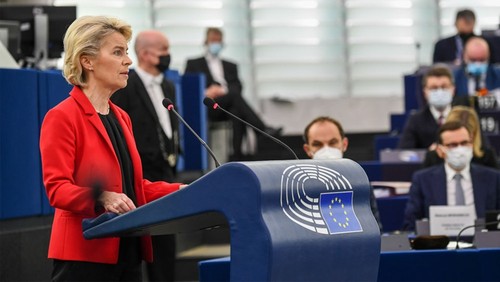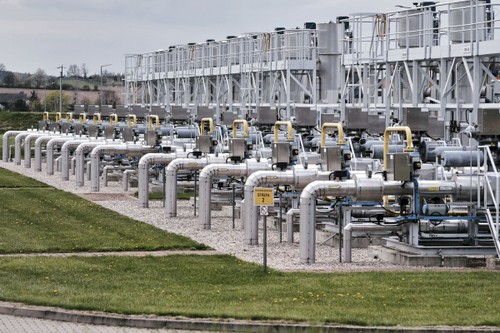 European Commission President Ursula von der Leyen announces a proposal for a new round of sanctions targeting Russian oil. Photo: European Parliament. European Commission President Ursula von der Leyen announces a proposal for a new round of sanctions targeting Russian oil. Photo: European Parliament.
|
Analysts say that, unlike the decision to stop using Russian coal, approved last month, the oil sanctions, if passed, would be a big blow to Russia. But the EU has been warned of international oil price hikes and the ban’s negative impact on the EU’s economy. It will be difficult to find a common voice, given the opposition from some EU members, particularly Hungary and Slovakia, which are strongly dependent on Russian energy.
The problem of reducing dependence on Russian energy
Oil and gas are two traditional weapons of Russian influence. For the EU, gas is now a more fearsome weapon and it is taking actions to avoid dependence on Russian natural gas.
Since Russia launched its special military operation in Ukraine in February, observers have pointed out that EU’s decades-long dependence has made President Putin's government more assertive. It was no coincidence that Russia began to take military action against Ukraine in February, the coldest time of the year when Europe has the highest heating demand. Because the European gas network spans multiple countries, Russia's shutdown of gas to Poland and Bulgaria affected more than just those two countries. Gas prices will increase as the gas piped from these two countries to other countries decreases. The gas shortage will eventually hurt other countries further downstream, such as France and Germany.
 Pipelines of the Wierzchowice gas storage facility in Poland. Russia cuts off gas supplies to Poland and Bulgaria after the two countries refuse to pay in rubles. Photo: Bloomberg Pipelines of the Wierzchowice gas storage facility in Poland. Russia cuts off gas supplies to Poland and Bulgaria after the two countries refuse to pay in rubles. Photo: Bloomberg
|
Energy supply tensions escalated on Tuesday, when Russia cut off gas to Poland and Bulgaria after the two countries refused Moscow's demand to pay for gas in Russian rubles. Under the payment mechanism proposed by Moscow, clients must open two accounts at a bank run by Russian energy giant Gazprom. The client pays into a USD or euro account, which is then transferred to a ruble account. The EU believes this payment plan violates existing EU sanctions against Russia.
Sanctions package’s impact and EU's predicament
The Russia-Ukraine escalation is proportional to the mutual sanctions between the EU and Russia. The EU sanctions are aimed at completely ending Russian oil imports in a short period of time, a task analysts say will not be easy. Halting gas imports from Russia will have consequences. Oil from Russia can be replaced by oil from other markets, but gas will be so much more difficult that the EU will certainly not have an alternative in the next few months or even years. Given its advantages in resources and geography, Russia has over the past few decades established a large, stable, and cheap gas distribution system for Europe. Some EU officials admit that an abrupt cessation of Russian energy will be hard, putting Europe’s economy at great risk of recession.
In the long run, Europe needs not only a strong political will but also an acceptance of lasting economic damage. A possible scenario is that even if Russia soon achieves its goals and ends its military campaign in Ukraine, will Europe continue to abandon its energy deals with Russia.